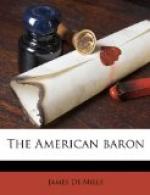And still the time passed, and the precious moments, laden with the fate not only of Hawbury, but of all the others—the moments of the night during which alone any escape was to be thought of—moved all too swiftly away.
Now in this hour of perplexity the good priest bethought him of a friend whose fidelity had been proved through the varied events of a life—a friend which, in his life of celibacy, had found in his heart something of that place which a fond and faithful wife may hold in the heart of a more fortunate man. It was a little friend, a fragrant friend, a tawny and somewhat grimy friend; it was in the pocket of his coat; it was of clay; in fact, it was nothing else than a dudeen.
Where in the world had the good priest who lived in this remote corner of Italy got that emblem of his green native isle? Perhaps he had brought it with him in the band of his hat when he first turned his back upon his country, or perhaps he had obtained it from the same quarter which had supplied him with that very black plug of tobacco which he brought forth shortly afterward. The one was the complement of the other, and each was handled with equal love and care. Soon the occupation of cutting up the tobacco and rubbing it gave a temporary distraction to his thoughts, which distraction was prolonged by the further operation of pressing the tobacco into the bowl of the dudeen.
Here the priest paused and cast a longing look toward the fire, which was not far away.
“Would you have any objection to let me go and get a coal to light the pipe?” said he to one of the men.
The man had an objection, and a very strong one.
“Would one of you be kind enough to go and get me a brand or a hot coal?”
This led to an earnest debate, and finally one of the men thought that he might venture. Before doing so, however, a solemn promise was extorted from the priest that he would not try to escape during his absence. This the priest gave.
“Escape!” he said—“it’s a smoke I want. Besides, how can I escape with three of ye watching me? And then, what would I want to escape for? I’m safe enough here.”
The man now went off, and returned in a short time with a brand. The priest gave him his blessing, and received the brand with a quiet exultation that was pleasing to behold.
“Matches,” said he, “ruin the smoke. They give it a sulphur taste. There’s nothing like a hot coal.”
Saying this, he lighted his pipe. This operation was accomplished with a series of those short, quick, hard, percussive puffs with which the Irish race in every clime on this terrestrial ball perform the solemn rite.
And now the thoughts of the priest became more calm and regular and manageable. His confusion departed, and gradually, as the smoke ascended to the skies, there was diffused over his soul a certain soothing and all-pervading calm.
He now began to face the full difficulty of his position. He saw that escape was impossible and death inevitable. He made up his mind to die. The discovery would surely be made in the morning that Hawbury had been substituted for the robber; he would be found and punished, and the priest would be involved in his fate. His only care now was for Ethel; and he turned his thoughts toward the formation of some plan by which he might obtain mercy for her.




